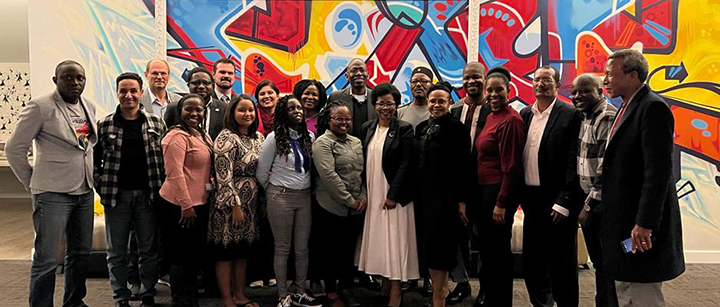
Equipped with state-of-the-art laboratories that provide students with hands-on experiences to bridge theory and practice
Unisa’s College of Agriculture in Environmental Sciences (CAES) hosted the first meeting of the African BioGenome Project (AfricaBP) Meeting at its Florida Science Campus on 22 and 23 August.

Unisa Principal and Vice-Chancellor, Prof Puleng LenkaBula, together with the AfricaBP delegates
Prof Ntanganedzeni Mapholi from CAES, in collaboration with her fellow African researchers under the umbrella of AfricaBP, has published a position paper in the journal Nature highlighting the goals, priorities and roadmap of the impressive Africa-led effort to sequence the genomes of plants, animals, fungi and protists that are endemic to the continent of Africa.
AfricaBP is a coordinated Pan-African effort to build capacity and infrastructure to generate, analyse and deploy genomics data for the improvement and sustainable use of biodiversity and agriculture across Africa. In June 2021, a pilot project was launched with the key objectives of sequencing 100,000 endemic species.
Since its inception, AfricaBP has built a strong case for the need to understand the continent’s biodiversity through genomics and ensure sustainable use of native plants, animals, fungi and protists.
The objectives of the meeting were to
The hybrid meeting was made possible through the support of Unisa, Illumina, the SFA foundation, the International Livestock Research Institute, the Centre for Tropical Livestock Genetics and Health, the University of Edinburgh, H3ABioNet and the University of Cape Town.
In attendance were delegates were from Illumina Biotechnology Company, the SFA Foundation, Separations, the South African Medical Research Council, the South African National Biodiversity Institute (SANBI) and Inqaba Biotech. Discussions were focused mainly on the detailed role each of the above-mentioned stakeholders can play within the AfricaBP project.
Outcomes of the meeting:
CAES Executive Dean, Prof Ramagoai Magano, said that Unisa is excited with the work done within the AfricaBP project and how the vision of the project aligns with that of Unisa, thus its full support was guaranteed, including that of both the Unisa Principal and Vice-Chancellor, Prof Puleng LenkaBula, and the Vice-Principal of Research, Postgraduate Studies, Innovation and Commercialisation, Prof Thenjiwe Meyiwa.
* Submitted by Poppie Khoza, Communication and Marketing Specialist, College of Agriculture and Environmental Sciences
Publish date: 2022-09-20 00:00:00.0